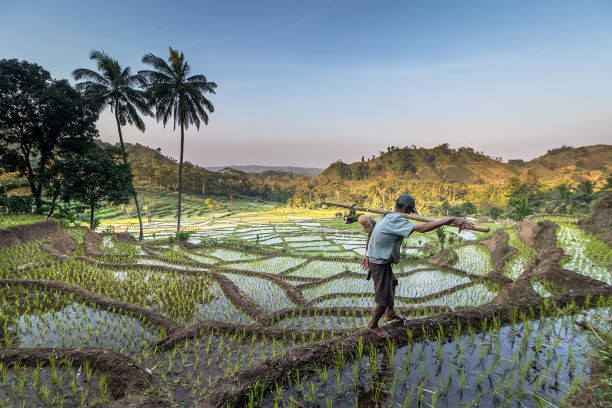Popular Reads
Top Results
Can't find what you're looking for?
View all search resultsPopular Reads
Top Results
Can't find what you're looking for?
View all search resultsReducing regulatory burden to enhance food security in ASEAN
As the pandemic drags on, ASEAN’s food production could be negatively impacted by increased workers’ morbidity, disruption in supply chains, and COVID-19 containment measures.
Change text size
Gift Premium Articles
to Anyone
T
he ongoing COVID-19 pandemic has significantly heightened the risks of food insecurity in many countries. This is driven not so much by actual food shortages but by other factors that have disrupted supply chains and ultimately driven up food prices.
According to a World Bank report in July 2021, the Agricultural Commodity Price Index has remained near its highest level since 2013, and as of June 15, 2021, was approximately 33 percent higher than in January 2020.
Such trends are also at play in our region. ASEAN as a group enjoys high food production levels and is a net exporter of agrifood products. In 2019, the value of ASEAN’s total agrifood exports stood at US$141 billion, while its total agrifood imports stood at $103 billion. Intra-regional trade currently accounts for one-third of ASEAN’s total agrifood trade.
But as the pandemic drags on, ASEAN’s food production could be negatively impacted by increased workers’ morbidity, disruption in supply chains, and COVID-19 containment measures. Governments’ attempts to restrict food exports to meet domestic needs could also make things much worse for countries reliant on food imports. The Southeast Asian region has also seen a spike in food price inflation, which rose from 2.1 percent in 2019 to 3.3 percent in 2020.
Amidst the risk of global and regional food insecurity, ASEAN member states have the potential to lend greater resilience to each other. One area of opportunity lies in governments’ willingness to streamline technical barriers to trade (TBT).
TBTs are regulatory measures enacted by importing countries that address quality requirements, labelling and packaging, certification, testing and inspection of products. Apart from ensuring regulatory and safety standards, they are also not infrequently enacted as protectionist measures to safeguard the interests of local food producers.
The net effect, however, is that these measures affect producers, importers and exporters by increasing information, compliance and procedural costs.
Over the past decade, ASEAN has made limited progress in streamlining TBT measures, notwithstanding ongoing efforts to reduce the trade-distorting effects of TBT measures and other non-tariff measures (NTM) on agrifood trade under the ASEAN Framework Agreement for the Integration of Priority Sectors signed in 2004. The global NTM database reveals that NTMs on agrifood trade in ASEAN’s priority sectors have doubled every decade, rising from 434 measures in 2000 to 1,192 measures in 2010 and to 2,181 measures in 2019.
The number of TBT measures rose from 84 in 2000 to 359 in 2019. The top five ASEAN member states that have imposed a relatively large number of TBT measures are Malaysia (61), Thailand (58), the Philippines (46), Brunei (42), and Vietnam (36).
The proliferation of TBTs can impede the ongoing efforts at deepening intra-ASEAN trade in agrifood products as well as significantly raise food prices. In order to gauge the extent to which TBT is restricting member states’ agrifood exports to other ASEAN markets, we have calculated each nation’s degree of exposure to TBT measures by multiplying the ad valorem equivalents (AVE) of an importing country’s TBTs with the exporting country’s share of agrifood exports to the importing country.
According to our study, the nation that was most severely affected by TBT measures was Vietnam, where these requirements pushed prices of imported agrifood products upward by 130.5 percent, followed by Brunei (101.3 percent), Cambodia (70.5 percent), Myanmar (66.9 percent) and the Philippines (31.6 percent).
There is potential to further increase intra-ASEAN trade in agrifood products if TBTs can be reduced. Currently, five ASEAN member states export at least 20 percent of their total agrifood exports to other ASEAN member states. These are Cambodia (70.3 percent of total exports), Laos (68.7 percent), Singapore (40.6 percent), Brunei (33.9 percent), and Myanmar (22.7 percent). Thailand, Malaysia and Indonesia export relatively less agrifood products within ASEAN — probably because their goods suffer from very high potential exposures to TBT measures in several key ASEAN markets. Thailand exports just 13.2 percent of its agrifood products within ASEAN, while Malaysia exports 15.2 percent and Indonesia 12.6 percent.
Our study suggests that different agrifood technical measures and standards imposed by regional governments lead to costly duplication in product development, manufacturing, and testing. These problems can be addressed by harmonizing agrifood technical measures and standards at the regional level or implementing Mutual Recognition Agreements (MRAs).
In the European Union (EU), for example, all products manufactured and traded by member states that do not fall under harmonized legislation are subject to mutual recognition. The principle of the EU MRA is based on the origin principle. That is, if a product is lawfully marketed in a member state, then its sale must not be prohibited in another member state, even if it were produced under different technical regulations.
The recognition of technical regulations is based on the minimum requirement approach that aims to protect public health and environment. The remainder of the specifications for products and processes are determined by private voluntary standards, which comply with national regulations.
For ASEAN, having harmonized agrifood technical measures and standards should reduce food prices, maintain consumer confidence in the quality and safety of agrifood products, and increase competitiveness of producers in the region. At a time when concerns about global food insecurity are looming large, this should be serious food for thought.
***
Sithanonxay Suvannaphakdy is lead researcher and Neo Guo Wei Kevin is a research assistant, ASEAN Studies Centre, ISEAS – Yusof Ishak Institute, Singapore.










